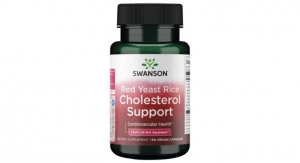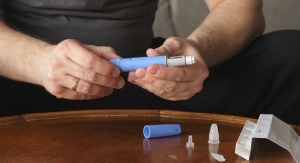01.25.23
An extended release caffeine ingredient marketed by Mumbai, India-based Nutriventia as CaffXtend was recently tested against a standard immediate-release caffeine ingredient in a new study appearing in The Journal of Dietary Supplements. CaffXtend was evidenced to be beneficial by comparison in mental performance, mood, and energy effects.
The study was a randomized, single-dose, two-treatment, two-sequence, two-period, two-way crossover bioavailability trial, where 15 healthy subjects took a supplement containing 200 mg sustained-release caffeine as CaffXtend, or an equivalent dose of immediate-release caffeine.
Blood samples were collected at 16 points throughout each 48 hour duration. The primary outcome was comparing the respective bioavailability of each ingredient, along with changes in the caffeine research visual analog scale (Caff-VAS) scores, which assessed domains including ‘relaxed,’ ‘alert,’ ‘jittery,’ ‘tired,’ ‘tense,’ ‘headache,’ ‘overall mood,’ and ‘mentally fatigued.’ Fifteen subjects completed the study.
The mean time to reach maximum concentration (Tmax) was more than four times longer in CaffXtend than it was in the standard caffeine ingredient.
Additionally, in the Caff-VAS evaluation, the sustained-release caffeine group showed significantly better scores for ‘jittery,’ ‘tiredness,’ ‘alertness,’ and ‘overall mood’ for eight to 12 hours longer than the immediate-release caffeine group. No side effects were reported.
The sustained plasma levels of caffeine in the SR-caffeine group were directly associated with the improved alertness and mood lasting for a longer duration, according to the authors.
“We assume that SR-caffeine in a single daily dose would offer an effective alternative for repeated daily doses of caffeine required to achieve a sustained stimulant effect throughout the day without causing the symptoms of a ‘caffeine crash,” the authors wrote. “These results need to be substantiated in long-term studies to signify the role of caffeine on cognitive performance and mental alertness, and to elucidate if sustained release caffeine will improve stimulation on long-term administration despite its tendency to induce strong habituation.”
“This strength and notability of this study is that caffeine can be and is safe, well-tolerated, and can do much more than just provide ‘wake-up energy,’” said Anand Godbole, vice president of marketing for Nutriventia. “Sustained-release caffeine, in fact, can help promote good mood, mental acuity, and a gentle feeling of calm energy.”
CaffXtend is encapsulated in microbeads to release caffeine over a 12-hour period gradually, and the ingredients that comprise the matrix are suitable for natural or clean label claims.
“We see products containing CaffXtend targeted to those in the workforce, moms and caregivers, as well as students, athletes, and for travel,” Godbole said.
The study was a randomized, single-dose, two-treatment, two-sequence, two-period, two-way crossover bioavailability trial, where 15 healthy subjects took a supplement containing 200 mg sustained-release caffeine as CaffXtend, or an equivalent dose of immediate-release caffeine.
Blood samples were collected at 16 points throughout each 48 hour duration. The primary outcome was comparing the respective bioavailability of each ingredient, along with changes in the caffeine research visual analog scale (Caff-VAS) scores, which assessed domains including ‘relaxed,’ ‘alert,’ ‘jittery,’ ‘tired,’ ‘tense,’ ‘headache,’ ‘overall mood,’ and ‘mentally fatigued.’ Fifteen subjects completed the study.
The mean time to reach maximum concentration (Tmax) was more than four times longer in CaffXtend than it was in the standard caffeine ingredient.
Additionally, in the Caff-VAS evaluation, the sustained-release caffeine group showed significantly better scores for ‘jittery,’ ‘tiredness,’ ‘alertness,’ and ‘overall mood’ for eight to 12 hours longer than the immediate-release caffeine group. No side effects were reported.
The sustained plasma levels of caffeine in the SR-caffeine group were directly associated with the improved alertness and mood lasting for a longer duration, according to the authors.
“We assume that SR-caffeine in a single daily dose would offer an effective alternative for repeated daily doses of caffeine required to achieve a sustained stimulant effect throughout the day without causing the symptoms of a ‘caffeine crash,” the authors wrote. “These results need to be substantiated in long-term studies to signify the role of caffeine on cognitive performance and mental alertness, and to elucidate if sustained release caffeine will improve stimulation on long-term administration despite its tendency to induce strong habituation.”
“This strength and notability of this study is that caffeine can be and is safe, well-tolerated, and can do much more than just provide ‘wake-up energy,’” said Anand Godbole, vice president of marketing for Nutriventia. “Sustained-release caffeine, in fact, can help promote good mood, mental acuity, and a gentle feeling of calm energy.”
CaffXtend is encapsulated in microbeads to release caffeine over a 12-hour period gradually, and the ingredients that comprise the matrix are suitable for natural or clean label claims.
“We see products containing CaffXtend targeted to those in the workforce, moms and caregivers, as well as students, athletes, and for travel,” Godbole said.




























